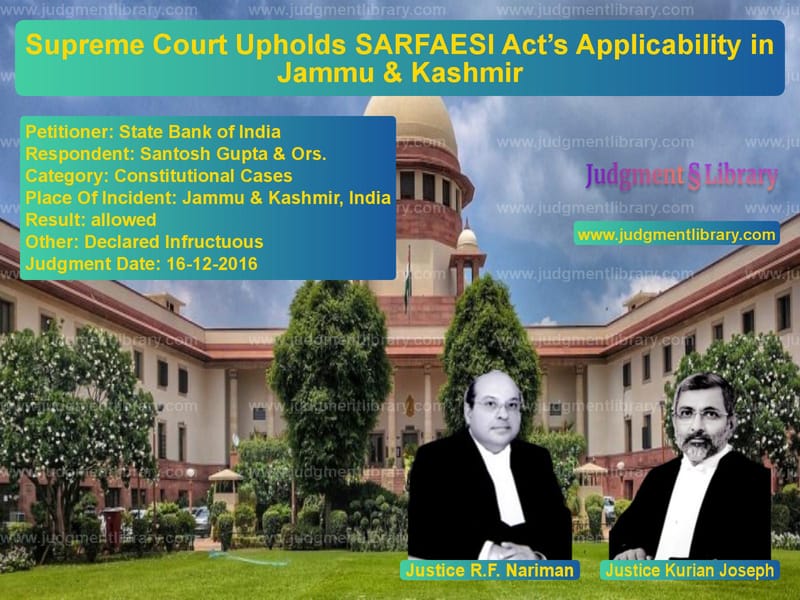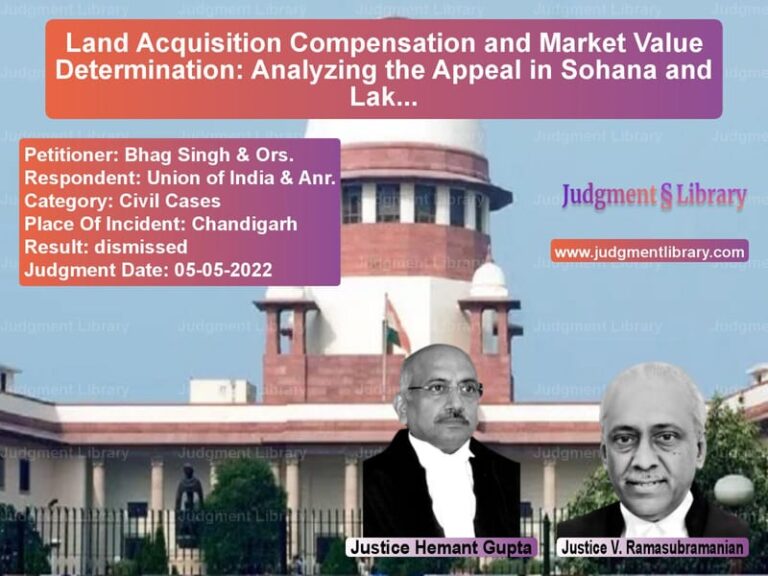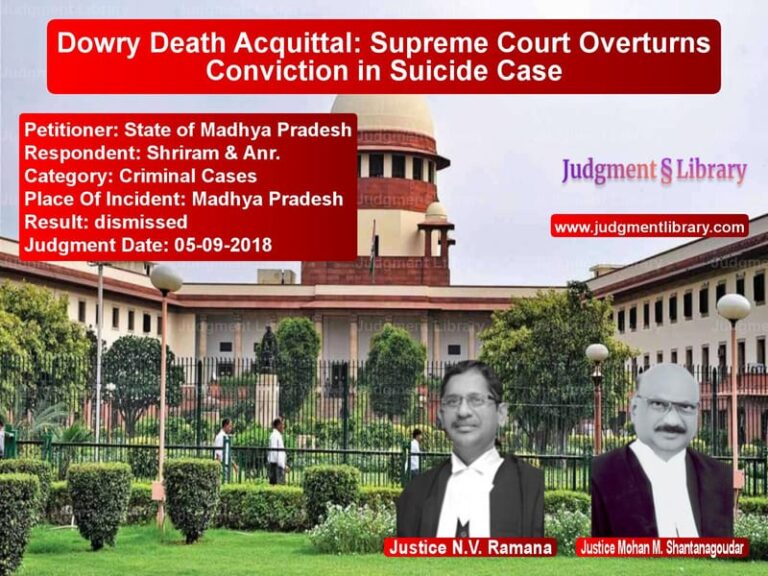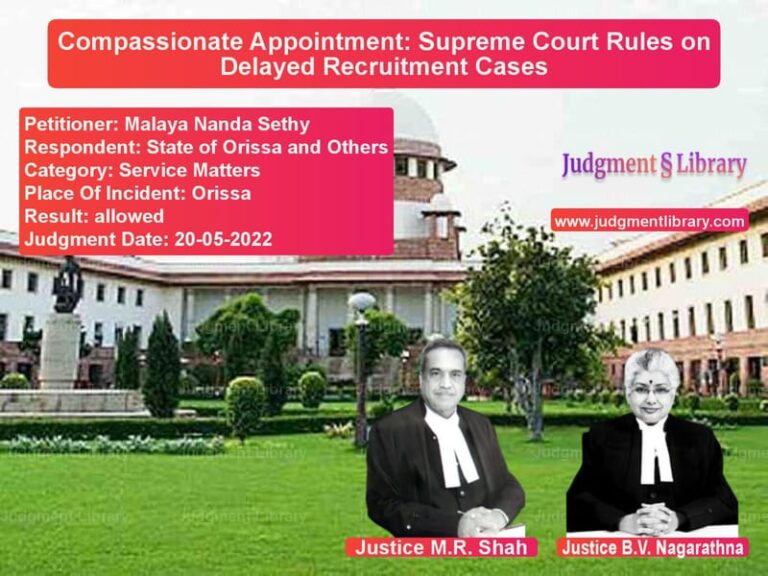Supreme Court Upholds SARFAESI Act’s Applicability in Jammu & Kashmir
The case of State Bank of India vs. Santosh Gupta & Ors. revolved around the legislative competence of Parliament in enacting and applying the Securitisation and Reconstruction of Financial Assets and Enforcement of Security Interest Act, 2002 (SARFAESI) to the State of Jammu & Kashmir. The Supreme Court overturned the Jammu & Kashmir High Court’s ruling that SARFAESI was beyond the legislative competence of Parliament. The Court upheld that banks and financial institutions operating in Jammu & Kashmir can invoke SARFAESI to recover loans from defaulting borrowers.
Background of the Case
The dispute arose when the Jammu & Kashmir High Court ruled that various key provisions of SARFAESI were inapplicable to the State due to its special status under Article 370 of the Constitution. The High Court held that SARFAESI conflicted with Section 140 of the Jammu & Kashmir Transfer of Property Act, 1920, which restricted the transfer of immovable property to non-residents of the State. As per the High Court’s judgment, laws affecting the property rights of permanent residents fell within the exclusive jurisdiction of the State Legislature.
The State Bank of India, along with other nationalized banks, challenged this decision in the Supreme Court, arguing that Parliament had legislative competence under Entry 45 (Banking) and Entry 95 (Jurisdiction and powers of all courts except the Supreme Court) of List I of the Seventh Schedule of the Constitution of India.
Legal Issues
- Does Parliament have the legislative competence to apply SARFAESI in Jammu & Kashmir?
- Does SARFAESI violate Section 140 of the Jammu & Kashmir Transfer of Property Act?
- Does SARFAESI infringe upon the special status of Jammu & Kashmir under Article 370?
- Can banks and financial institutions recover debts under SARFAESI within the State?
Arguments by the Petitioners
- Parliament has the power to legislate on banking and financial matters under Entry 45 and Entry 95 of List I of the Constitution.
- SARFAESI does not deal with the transfer of property but rather the recovery of debts, which is an essential function of banking.
- The Constitution (Application to Jammu & Kashmir) Order, 1954, extended banking laws, including debt recovery laws, to the State.
- The High Court’s judgment incorrectly treated the State Constitution as superior to the Constitution of India.
Arguments by the Respondents
- The Constitution of Jammu & Kashmir grants exclusive legislative power to the State regarding property laws.
- Section 140 of the Jammu & Kashmir Transfer of Property Act prohibits the sale of immovable property to non-residents.
- Since the High Court had ruled that SARFAESI violated the property rights of permanent residents, Parliament lacked the authority to apply the law in the State.
- Article 35A, which grants special privileges to permanent residents, restricts the application of Central laws that interfere with property rights.
Supreme Court’s Judgment
The Supreme Court rejected the High Court’s reasoning and upheld the applicability of SARFAESI to Jammu & Kashmir. The key observations were:
- The entire SARFAESI Act falls under Entry 45 (Banking) and Entry 95 (Jurisdiction of courts) of List I, giving Parliament exclusive legislative power.
- Section 140 of the Jammu & Kashmir Transfer of Property Act does not override SARFAESI, as the latter does not deal with property transfers but rather the enforcement of security interests.
- Article 370 does not prevent Parliament from enacting banking laws applicable to Jammu & Kashmir.
- Rule 8(5) of the SARFAESI Rules ensures that sales of mortgaged properties comply with Jammu & Kashmir’s property laws, addressing concerns over non-resident purchases.
The Court held:
“The State of Jammu & Kashmir has no vestige of sovereignty outside the Constitution of India and its own Constitution, which is subordinate to the Indian Constitution.”
Impact of the Judgment
- Establishes that Parliament has the power to enact laws for financial and banking regulation in Jammu & Kashmir.
- Clarifies that SARFAESI does not violate the special status of Jammu & Kashmir under Article 370.
- Ensures that banks can enforce security interests and recover debts from borrowers in the State.
- Strengthens financial institutions’ ability to operate in Jammu & Kashmir without being hindered by State laws conflicting with Central legislation.
Conclusion
The Supreme Court’s ruling reinforces the principle that banking laws enacted by Parliament apply uniformly across India, including Jammu & Kashmir. The decision ensures that banks and financial institutions have the legal backing to recover debts through SARFAESI in the State, aligning it with the national banking framework.
Don’t miss out on the full details! Download the complete judgment in PDF format below and gain valuable insights instantly!
Download Judgment: State Bank of India vs Santosh Gupta & Ors. Supreme Court of India Judgment Dated 16-12-2016.pdf
Direct Downlaod Judgment: Direct downlaod this Judgment
See all petitions in Fundamental Rights
See all petitions in Judgment by Rohinton Fali Nariman
See all petitions in Judgment by Kurian Joseph
See all petitions in allowed
See all petitions in Declared Infructuous
See all petitions in supreme court of India judgments December 2016
See all petitions in 2016 judgments
See all posts in Constitutional Cases Category
See all allowed petitions in Constitutional Cases Category
See all Dismissed petitions in Constitutional Cases Category
See all partially allowed petitions in Constitutional Cases Category






